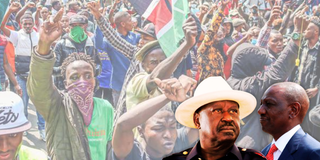Premium
Leaders must listen, learn to engage better

Raila Odinga denied that he had a 'handshake' deal with President William Ruto and that he had benefited from the Gen Z protests over the Finance Bill 2024, which he said was necessary to prevent the country from descending into chaos.
As we begin the New Year, the world stands at a crossroads. Profound shifts across every aspect of life — economy, politics, social practices, and more — are reshaping societies unevenly.
The surge in digital access and amplified freedom of speech have sparked remarkable ideas, innovations, and transformations, driven by technology and education.
In Kenya, the events of June 2024 marked a turning point. The Gen Z-led protests disrupted the political landscape, signalling that the nation must chart a new course toward progress.
Kenya’s demographic shift is unmistakable, with a growing number of educated, tech-savvy, and connected young people.
Despite the country’s economic growth, youth unemployment remains high, and many Gen Z members feel disconnected from the transformation around them.
Technology, particularly internet connectivity and social media, has become a powerful tool for mobilizing and raising awareness, with social media playing a crucial role in organizing the June protests.
While traditional media has little reach among Gen Z, social media has flourished. Influencers like Elon Musk have reinforced citizen journalism, amplifying the power of platforms like X (formerly Twitter) to push for political change.
Apps like Zello, which facilitated real-time coordination during the protests, and AI-driven tools for policy discussions, signify a shift in how Kenyans engage with politics.
Unlike countries such as Uganda, where social media access is restricted during unrest, Kenyans continue to use these platforms to air grievances and demand change.
More than two months after the initial protests, the effects are still being felt, but no new clear path has emerged. The promise of change continues, as seen in the December 2024 “Citizens Assembly: Jamhuri Day Special” on X, where influencers discussed tax boycotts and further actions.
Kenya’s leaders must rethink their communication strategies to engage the digital-native generation effectively. It’s no longer enough to address crises; sustained dialogue on policy, programmes, and consultations must take place on platforms where youth are active, like X. AI-driven tools should also be explored as part of this engagement.
The ongoing debate over issues like livestock vaccination and university funding highlights a growing mistrust in the government, with social media amplifying alternative views. Negative reactions to government pronouncements, especially when promises are perceived as unfulfilled, must be addressed with evidence-based analyses and more public participation.
Failure to adapt could prove detrimental to leaders. The Gen Z protests are not a passing moment, and continued unrest may follow if young people feel their voices are ignored. As we enter 2025, the government must learn to listen and engage more effectively to avoid further discontent.
Here’s to a better and more prosperous 2025.
Mr Mutugi is a corporate communications consultant. [email protected]




